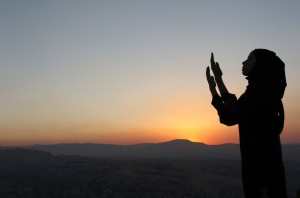Michelle May, M.D. answers a question about fasting and mindful eating
 Question: I am learning to eat mindfully but I am concerned about the upcoming fasting month of Ramadan when I will fast completely during sunlight. Ramadan has moved up a few days each year, so now the fasting is during the really long, hot summer days. How do I handle postponing hunger for 12 hours? In the past, I often binged at sunset!
Question: I am learning to eat mindfully but I am concerned about the upcoming fasting month of Ramadan when I will fast completely during sunlight. Ramadan has moved up a few days each year, so now the fasting is during the really long, hot summer days. How do I handle postponing hunger for 12 hours? In the past, I often binged at sunset!
Dr. May responds:
Fasting may be necessary from time to time for a spiritual practice, a medical procedure, or simply because food is temporarily unavailable. The reality is that most of us experience eight hours or more of fasting during sleep (hence, break-fast) and our bodies manage this effortlessly. The differences between an overnight fast and other forms of fasting include increased fuel needs during your waking hours—and your conscious state, making you more aware of the physiological and psychological effects of going without food!
Here are a few thoughts about how to be mindful even if you are sometimes unable to eat when you feel hungry.
Focus on your intention.
Remember that self-care is not just diet and exercise; it is about caring for your body, mind, heart, and spirit. Therefore the benefits of a spiritual practice may easily outweigh any potential negative physiological effects of fasting. Further, fasting for medical reasons is sometimes necessary and unavoidable, and ultimately for your health as well.
Remember that you have a choice.
To avoid the problems that commonly result from a Restrictive Eating Cycle (including a rebound Overeating Cycle), recognize that your fast is serving a specific purpose, that you are choosing to fast, and that you are not depriving yourself.
Don’t miss the lesson.
Use your fast as a learning exercise. When I had to fast for a medical procedure, I discovered that it helped me become more aware of hunger and other my physical sensations, thoughts, and feelings. This heightened awareness can be a very powerful learning tool so reframe fasting as a positive experience.
Break the fast mindfully.
When you’re ready to break the fast, remember that being really, really hungry, doesn’t mean that you need twice as much food! After all, your total stomach capacity stays the same. Being really hungry just means you need to eat sooner!
At the end of the fast, your hunger level may be a 1. At that point, your hunger symptoms may be very strong and even uncomfortable. Your blood sugar is low so you may have difficulty making mindful choices. This can be a high risk time for eating too much, too fast. (To learn more about using a Hunger and Fullness Scale see chapter 2 of Eat What You Love, Love What You Eat.)
Therefore you may find that it is helpful to eat a little bit of food then pause to allow your blood sugar to come back up so can think clearly and make mindful decisions. (In addition, depending on the nature of your fast, there may also be significant dehydration and fatigue. Try to stay well rested and hydrated during your fast; if fluids are not allowed, hydrate first when you break the fast.)
After your fast, be very intentional about eating mindfully. My Grandmother used to say that hunger is the best seasoning. Your fast will likely heighten your enjoyment of food and the social connections of breaking the fast together.
